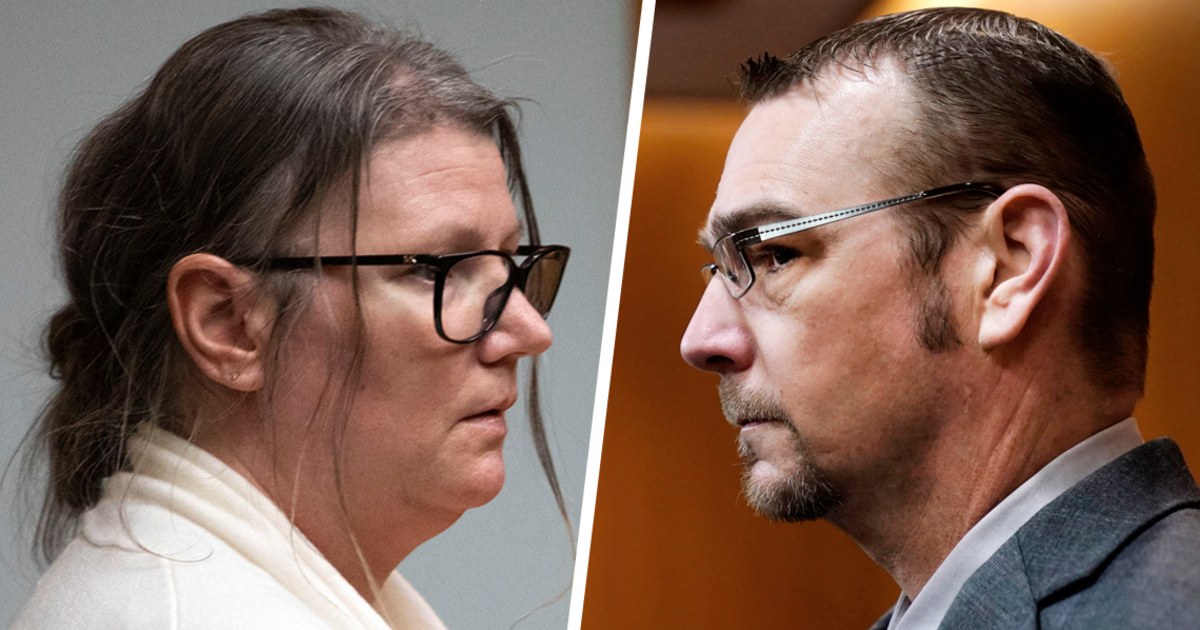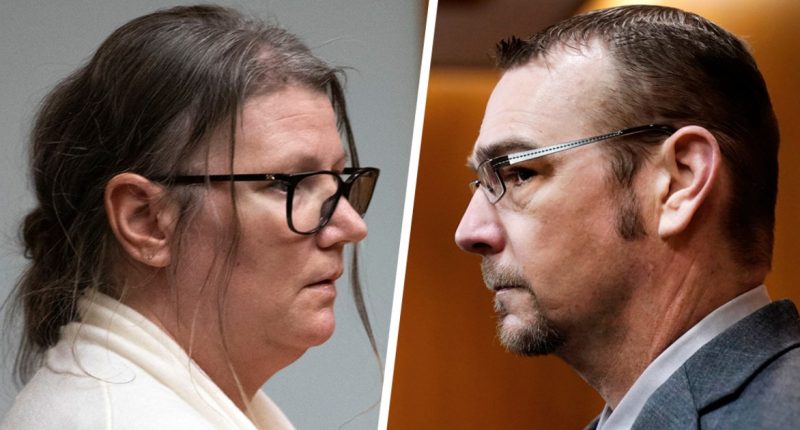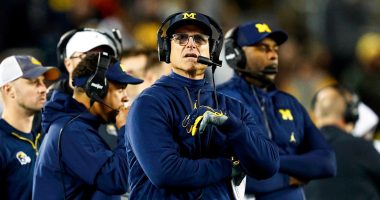
PONTIAC, Mich. — The charges prosecutors brought against the mother and father of teenage school shooter Ethan Crumbley were identical and hinged on convincing jurors that while neither parent knew their son was plotting a deadly attack, they both failed in their legal responsibilities to help prevent it.
But clinching convictions for involuntary manslaughter in two separate trials — one last month for Jennifer Crumbley and the other decided Thursday for James Crumbley — came under widely different circumstances, Oakland County Prosecutor Karen McDonald said Friday.
“I think from an evidentiary standpoint, they’re both very different cases,” McDonald said. “Jennifer’s case involved a lot of information we knew she had. And the case against James was much more focused on the gun because he purchased it.”
Ethan, now 17, pleaded guilty as an adult to murder, terrorism and other charges in the deaths of four Oxford High School students in 2021. He was sentenced to life in prison.
While core evidence and witnesses were similar in the two trials — the first time in the U.S. that parents were charged in connection with their child’s mass school shooting — prosecutors had to show how James and Jennifer Crumbley were individually at fault while facing two differing defense strategies and two sets of jurors, the majority of whom were parents and gun owners or were familiar with firearms.
“It was a very challenging prosecution to bring,” said Mark Chutkow, a lawyer who previously led the criminal division of the U.S. attorney’s office in Detroit and is not affiliated with the case.
Separate prosecution strategies
A request was granted in November for Jennifer Crumbley, 45, and James, 47, to sever their trial as co-defendants.
McDonald said Friday that the prosecution “didn’t want to do two trials” but agreed that doing so was necessary because “finger-pointing” between the two defendants in a single trial could have ultimately led to a mistrial.
“That’s something we just could not risk,” McDonald said.
And there was finger-pointing: At her trial, Jennifer Crumbley took the stand in her own defense and testified that the gun “was his thing,” referring to her husband’s responsibility to secure the 9 mm Sig Sauer handgun and the family’s other two firearms. James Crumbley bought the handgun for Ethan a day after Thanksgiving, she said, and the then-15-year-old would use it in the shooting at Oxford High School four days later. In James’s defense, his lawyers highlighted his cooperation while being questioned by police in the aftermath of the shooting, in contrast to Jennifer who appeared reluctant to give up her phone and was the first one to bring up hiring a lawyer.
Prosecutors had more than 400 pieces of evidence against Jennifer Crumbley, including text messages and photos from her cellphone, as well as video showing her with Ethan at a gun range the weekend before the shooting. Among the most significant were messages Ethan sent to his mother saying he was seeing “demons” in the house and claiming it was haunted and asking her to respond. Her extramarital affair also came under focus, including testimony from the man she was having a relationship with, which was another way for prosecutors to not only suggest that she was neglecting her son but that it was part of a larger pattern.
Jennifer Crumbley also testified that she knew her son was struggling emotionally, in part, because his best friend had moved away.
“There was a couple of times when Ethan had expressed anxiety over taking tests, anxiety about what he was going to do after high school, whether it was college, military,” she told jurors. “So he expressed those concerns to me. Not to a level where I felt he needed to see a psychiatrist or mental health professional right away.”
She would go on to say in her testimony: “I don’t think I’m a failure as a parent.”
After she was convicted, a juror told NBC News that the fact that Jennifer Crumbley had been the last known person to handle the 9 mm handgun after she took her son to the gun range helped solidify that she had a responsibility to prevent the shooting, even if she didn’t know specifically that he was planning the rampage. The juror added that other jurors were persuaded by evidence from Ethan’s journals. The teen had written, “My parents won’t listen to me about help or a therapist,” and expressed his desire to “shoot up” his school.
Jeffrey Swartz, a former county judge in Florida and professor at the Cooley Law School in Michigan and Florida, said that in the case of Jennifer Crumbley, prosecutors “had to make her seem like a negligent parent.”
But in James Crumbley’s case, the evidence was more glaring because he had told investigators that he was the last person to handle the weapon by hiding it in an armoire and placing the ammunition underneath jeans in another drawer.
Prosecutors “knew who bought the gun,” Swartz said. “They knew she wasn’t responsible for the gun — James was.”
The evidence showed that James Crumbley understood how to safely secure a firearm because he owned two others, and investigators found in the home a gun safe for his weapons, a cable lock for the 9 mm handgun and a pamphlet about gun safety around juveniles.
“They had all the mechanisms for storing it properly, and they didn’t,” Swartz said. “That is also a problem.”
In her closing argument, McDonald held up a handgun to demonstrate to the jury how quickly it takes to insert a cable lock on a weapon.
“You know, you always take a risk that that can go wrong in the moment, but it was so easy,” McDonald said Friday.
Chutkow said that likely left a lasting impression on jurors, comparing it to how O.J. Simpson, during his 1995 double murder trial, unsuccessfully tried to put on gloves found at the crime scene. His defense lawyer, Johnnie Cochran, famously uttered: “If it doesn’t fit, you must acquit.”
“Stunts” can be risky, Chutkow said. “If you flub it up and it doesn’t go well, it could sink your case. But she did it effectively.”
Different defenses
Unlike his wife, James Crumbley waived his right to testify.
Swartz said Jennifer Crumbley “had no choice” but to take the stand because she needed to tell jurors that she had entrusted her husband to keep the guns safely stored.
James Crumbley, however, was already at a disadvantage because he was being tried after his wife had already been found guilty — and, by taking the stand, he would have opened himself up to even more scrutiny about what he did, or didn’t do, regarding the gun.
Also at the center of both trials was a drawing Ethan did on his math homework depicting a gun, a shooting victim and messages such as: “The thoughts won’t stop. Help me.” A teacher alerted school administrators, and the Crumbleys were summoned to Oxford High School on the morning of the shooting.
But school staff testified at both trials that the parents never warned them that Ethan had access to a gun nor offered to take him home, saying they had work. Jennifer Crumbley worked in marketing, and James Crumbley was a DoorDash delivery driver.
At James Crumbley’s trial, a computer crimes expert testified that Crumbley had not begun his DoorDash job until after the school meeting and that he then drove by the family’s home four times, which suggested he had the opportunity to check that the guns were secure.
Crumbley’s lawyer, Mariell Lehman, pushed back at the prosecution’s witnesses on cross-examination, particularly by deflecting blame onto school officials because they were aware of the drawing and of Ethan’s struggles, and suggesting they could have done more.
“With all of this, all of the knowledge that you had on Nov. 30 of 2021 … you did not feel that he was a threat to anyone and you did not feel that you had reasonable suspicion to look in his backpack?” Lehman asked a former school dean, who responded, “No.”
In her closing argument, Lehman pointed out that the prosecution had to prove its case beyond a reasonable doubt but that it presented no evidence showing that James Crumbley knew his son was a danger to the public or had access to the gun.
Her presentation was far different from Jennifer Crumbley’s lawyer, Shannon Smith, who acknowledged that the mother had a “messy life,” but urged jurors not to hold that against her because any one of them could find themselves in her client’s shoes.
“This case is a very dangerous one for parents out there,” she said.
It’s unclear if either Jennifer or James Crumbley will appeal their convictions. Smith declined to comment, and Lehman said in a statement that James Crumbley “feels terrible” about the students who were killed and is “obviously disappointed with the outcome.”
The Crumbleys each face up to 15 years in prison per four counts of involuntary manslaughter. In Michigan, felonies that rise out of the same event must run concurrently, so the most the judge can impose is 15 years in total.
For now, the husband and wife share something else in common: They will both be sentenced on April 9.
Selina Guevara and Adrienne Broaddus reported from Pontiac, and Erik Ortiz from New York.
Source: | This article originally belongs to Nbcnews.com









